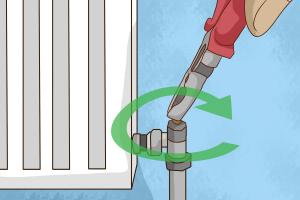Mastering Your Home Comfort: A Comprehensive Guide on How to Turn a Radiator Off

-
Quick Links:
- Introduction
- Understanding Radiators
- How to Turn Off a Radiator
- Troubleshooting Common Issues
- Energy Saving Tips
- Expert Insights
- Case Studies
- FAQs
Introduction
In any household, maintaining the right temperature is crucial for comfort and energy efficiency. Radiators are common fixtures in many homes, providing essential heating during colder months. However, knowing how to manage them effectively—such as turning them off—is key to optimizing energy use and maintaining comfort levels. This comprehensive guide will delve into the ins and outs of radiator operation, providing step-by-step instructions, troubleshooting tips, and expert insights.
Understanding Radiators
Before we get into the specifics of turning off a radiator, it’s important to understand how they work. Radiators operate by heating water or steam that circulates through them, radiating warmth into the surrounding air. There are various types of radiators, including:
- Conventional Radiators: Most common in homes, they use hot water to generate heat.
- Steam Radiators: Operate using steam and are often found in older homes.
- Electric Radiators: Use electricity to heat elements within the radiator.
Each type has specific controls and mechanisms for turning off the heat, which we will explore in detail.
How to Turn Off a Radiator
Step-by-Step Guide to Turning Off a Conventional Radiator
- Locate the Thermostat: Most conventional radiators have a thermostat valve. This is often a dial or lever at one end of the radiator.
- Adjust the Thermostat: Turn the thermostat to the 'off' position or the lowest setting.
- Check the Valve: If your radiator has a manual valve, turn it clockwise to close it.
- Wait for the Radiator to Cool: It may take some time for the radiator to cool down completely. Ensure it is safe to touch before proceeding.
Turning Off a Steam Radiator
- Identify the Steam Valve: Look for the valve at the top or side of the radiator.
- Close the Valve: Turn the valve clockwise to shut off the steam supply.
- Monitor the Temperature: Similar to conventional radiators, allow time for the radiator to cool down.
Turning Off an Electric Radiator
- Find the Power Switch: Electric radiators often have a power switch or a thermostat control.
- Turn Off the Heater: Switch it off or set it to the lowest temperature.
- Unplug if Necessary: If you want to ensure it remains off, unplug the unit from the wall.
Troubleshooting Common Issues
Sometimes, turning off a radiator may not work as expected. Here are common issues and their solutions:
- Radiator Still Hot After Turning Off: Ensure the valve is fully closed and check for any leaks in the system.
- Thermostat Not Responding: This may require recalibration or replacement.
- Noise from Radiator: Gurgling or banging sounds often indicate trapped air, which can be resolved by bleeding the radiator.
Energy Saving Tips
Turning off radiators when not in use is just one part of energy efficiency. Consider these additional tips:
- Install Thermostatic Radiator Valves (TRVs): These allow for better control of heating in individual rooms.
- Insulate Pipes: Insulating pipes helps retain heat and reduce energy loss.
- Regular Maintenance: Keep radiators clean and free of obstructions to ensure optimal performance.
Expert Insights
We consulted HVAC professionals to gain insights into the efficient management of heating systems. According to John Smith, an HVAC technician, “Properly managing your radiator not only enhances comfort but can also lead to significant energy savings over time.”
Case Studies
To illustrate the impact of proper radiator management, we examined two households:
- Household A: Implemented a regular radiator maintenance schedule and saw a 20% reduction in heating costs.
- Household B: Left radiators unchecked and experienced inconsistent heating, leading to higher energy bills.
FAQs
1. How do I know if my radiator is off?
Check the temperature of the radiator; if it’s cool to the touch, it’s off.
2. Can I turn off a radiator in the summer?
Yes, turning off radiators during warmer months can save energy.
3. What if my radiator won’t turn off?
Check for valve issues and consider consulting a professional if problems persist.
4. Is it safe to turn off radiators?
Yes, as long as you follow the proper procedures and ensure the rest of the heating system is unaffected.
5. Can I turn off individual radiators?
Yes, individual radiators can be turned off without affecting the entire system, provided they are independently controlled.
6. What is the best way to bleed a radiator?
Use a radiator key to open the bleed valve at the top of the radiator and allow air to escape until water begins to flow.
7. How often should I check my radiators?
Regularly check your radiators at least once a season to ensure they are functioning properly.
8. Will turning off radiators save me money?
Yes, turning off radiators in unused rooms can lead to significant energy savings.
9. Can I turn off my radiator if it's leaking?
No, it’s important to address leaks immediately to prevent water damage and ensure safety.
10. Do I need to turn off the heating system when turning off radiators?
No, you can turn off individual radiators without affecting the heating system as a whole.
Random Reads
- How to set reminders on iphone calendar
- Take screenshots faster snipping tool shortcut
- How to locate your sewer cleanout
- How to set up out of office in outlook
- Your guide to placing fence posts in the ground
- Mastering fishing in pokemon emerald
- Why does your phone keep restarting
- Mastering google drive uploading files
- Mastering the art of selling
- How to keep youtube playing in background iphone ipad